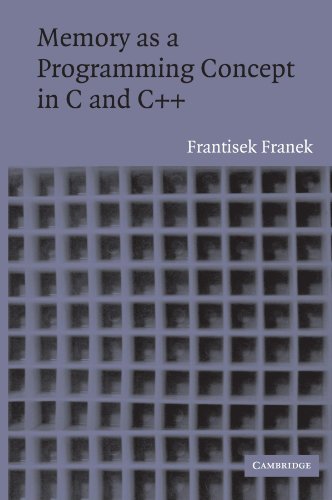Memory as a Programming Concept in C and C++ pdf
Par peters martha le lundi, novembre 28 2016, 23:42 - Lien permanent
Memory as a Programming Concept in C and C++ by Frantisek Franek


Memory as a Programming Concept in C and C++ Frantisek Franek ebook
Format: chm
Page: 272
ISBN: 0521520436, 9780521520430
Publisher: Cambridge University Press
C++ is an Object Oriented Programming language, here we will discuss the concepts of C++ that are not present in C, also assuming that readers already having knowledge on C language. This hash table is written using Mintomic, a portable library for lock-free programming in C/C++ which I released last month. (B) permit data to be hidden from other classes. This is different from the stack, as stack allocations are based on a first -in-last-out concept, such that when returning from a function data can be lost unless explicitly posted to a common “return” point. One of the more important concepts in C and C++ programming is the use stack based objects that do not require dynamic memory alloation. Re "hierarchical & sequential": con/destructors and RAII ultimately tie memory and resource lifetime to sequential control flow through hierarchically nested scopes. It compiles & runs on several x86/64, PowerPC and ARM-based platforms straight out of the box. C++ is the third most popular programming language, behind C and Java. A comparative guide to C and C++ for Java programmers. Every c++ programmer should have grip over the object oriented programming concepts in c++. Assuming readers have a basic familiarity with C or C++, Frantisek Franek describes the techniques, methods and tools available to develop effective memory. However, there are still many C++ programmers out there so there still some PL researchers working on C++, and it is a nice/uncrowded niche if you can stomach it. Many of these efforts, notably the C++0x concept design, have run into trouble by focusing on the design of language features. Memory Management in C and C++ programming languages. Dynamic memory allocation is a common feature of programming languages (or libraries, such as in C/C++[3]) that allow allocation of varying sized pieces of data at run-time. With all of the additions, though, C++ has a little more overhead in terms of things like memory usage and file size. (C) bring together all aspects of an entity in one place. A property which is not true for classes is that they (A) are removed from memory when not in use. So practice these cpp objective questions on oop concepts and improve your object oriented programming skills. (D) Can closely model objects in the real world.